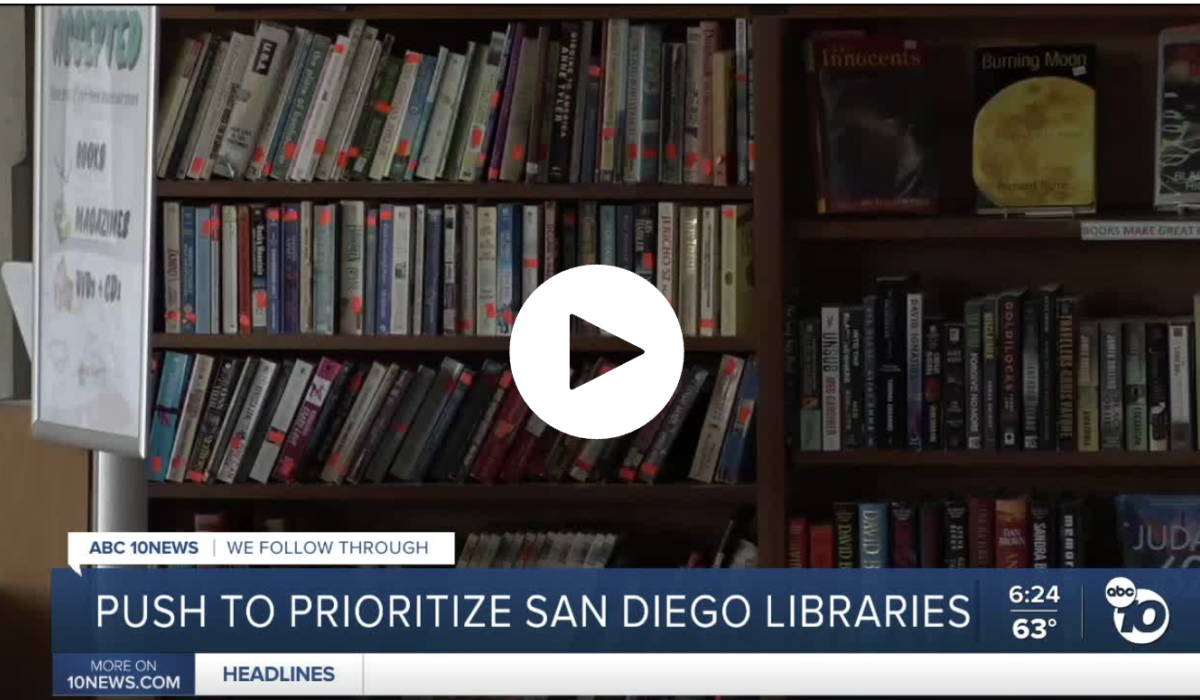
As the city reevaluates its priorities, I urge our leaders to start seeing the San Diego Public Library as the cornerstone of public services that it is.
In his 2025 State of the City address, Mayor Todd Gloria emphasized the need for strategic decisions to address San Diego’s $258 million budget deficit. The mayor noted that this was a moment of “immense challenge” but also an “immense opportunity” to reimagine how City Hall delivers and meets the needs of residents, San Diegans like you and me.
As the city reevaluates its priorities, I urge our leaders to start seeing the San Diego Public Library as the cornerstone of public services that it is. Alongside police, fire and parks, I believe the library is one of the core departments essential to San Diego’s future.
With impending citywide budget cuts on the horizon, tens of millions of dollars in deferred facility maintenance and another year failing to inch closer to honoring the decades-old library ordinance threatening the library system’s ability to serve the community, it is imperative that the coming city budget prioritize funding for programs and services over simply maintaining open hours. In the process of developing the Library Master Plan, a comparative analysis of California library budgets discovered that the San Diego Public Library’s operating budget is already less than 70% of the state average — enough is enough. We need to continue to ensure that all residents have opportunities to thrive and libraries provide unparalleled access to critical resources that support youth academic preparedness, workforce development and technology services.
San Diego Public Libraries serve as gateways to education and equity. Preserving programs like early literacy initiatives and afterschool academic support is vital to preparing youth for success. Cutting funding for these programs would jeopardize the city’s long-term goals of creating a well-educated and economically stable population.
A parent whose son relies on the Homework Center at the San Diego Central Library @ Joan Λ Irwin Jacobs Common reached out with concerns over the future of services. “These centers are essential to every neighborhood and play a critical role in supporting students and families,” she wrote. “However, for children like my son (who has ADHD), they offer a unique environment that is unmatched in its ability to meet his specific needs. They have been instrumental in helping my son thrive academically and maintain a consistent routine.” She said threats to the centers “feels like a profound disservice to families” and she urged leaders to consider alternate solutions like reduced hours over complete closure. These resources fill gaps for students who lack access to private tutoring or technology at home. The library programs ensure every child has the opportunity to build a strong educational foundation.
The library system is integral to economic and workforce development.

An entrepreneur accesses free small business resources at the San Diego Central Library @ Joan Λ Irwin Jacobs Common’s The StartUp.
With rising economic uncertainty, these library services are more critical. The programs offer job application assistance, technology training, entrepreneur support and resume workshops that empower residents to pursue and expand career opportunities, especially those in underserved communities. Maintaining robust workforce development programs like these ensures that libraries remain engines of economic mobility and self-sufficiency.
As was evident during the pandemic, and continuing today, libraries provide critical technology access, which is essential in today’s increasingly digital world.
Many San Diego residents rely on libraries for free internet access, computers and technical training tools they need to apply for jobs, complete schoolwork or access public services. The Library Master Plan adopted unanimously by the city highlights that without investments, these vital technology services could become unreliable or inaccessible and could leave vulnerable populations further disconnected. Ensuring the integrity of the library’s technological infrastructure is key to empowering all residents to succeed in the modern economy.
Now is not the time to balance the budget on the back of the library. As one of San Diego’s core departments, libraries are vital hubs for connection, education and community resilience. By addressing deferred facility maintenance, and by maintaining a focus on youth, workforce development and technology access, San Diego can ensure its library system remains a critical driver of progress. A world-class city like San Diego must invest in institutions that empower its residents, support its economy and build connected communities. The San Diego Public Library is one such institution. Preserving it needs to be a priority for our city’s future.
Stewart is CEO of the Library Foundation and lives in Clairemont.


